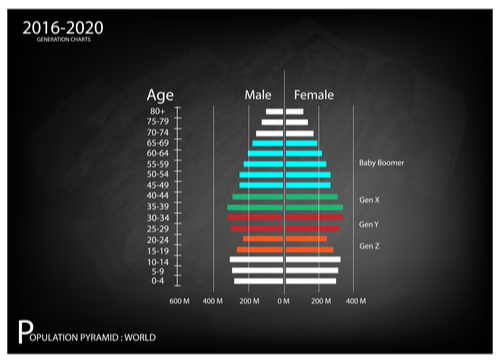Marketing a Home to Generation Z
Marketing tips and suggestions for home sellers who want to attract buyers from generation Z.
While Millennials get most of the attention, another generation is emerging onto the home-buying scene. Also known as the Net or Digital Generation, Gen Z is ready for the real estate market, but with its own unique approach. Here’s what you need to know to effectively market your home to this young group of buyers.
Who is Generation Z?
Composed of people born between 1996 and 2010, the oldest portion of this generation is now in their twenties. Throughout their young lives, this generation has grown up in a time of autonomy. They’re naturally more independent and able to navigate problems on their own (with the help of a cell phone.)

Gen Z’s proximity to technology enables them to begin earning money faster than past generations. There’s no technical learning curve. With respect to real estate, the tip of this generation has had time to establish a career path, and many have enough money for a downpayment on a home. They’re ready to buy, but new to the housing market. They also do not share the same buyer characteristics as those we’ve seen before.
What makes them different homebuyers
Because of the unique qualities of this generation, they shop for and purchase homes differently. This means sellers may have to change their approach. Getting the optimal result requires a more technologically involved process where you have to align with what Gen Z wants in a home. Here are some pointers.
Sensitivity to debt
As a group, Generation Z carries a high amount of student debt. They “feel the burn” of that responsibility. As a result, they take a more conservative approach to large purchases that incur even more debt. This can impact the price they’re willing to pay for a house, as well as what interest rates will work for them. They’ll want to feel like they’re getting a deal when buying a home, and they’ll exploit every opportunity to save a little cash.
Seller takeaway: Pricing your home too far above market value, or not being willing to negotiate, could have Gen Zers walking away from purchasing your home.
Technology as a home amenity
Because this generation relies heavily on technology, older homes can look outdated fast. Since they never knew a life without a cell phone, and by the time they were old enough to have one of their own, iPhones already existed, they’re reluctant to go into a home without modern upgrades. A fixer-upper for Generation Z is more about the tech than the kitchen counters, bathroom fixtures, and flooring.
Seller takeaway: Features such as smart appliances, a connected thermostat, and USB docking stations might outweigh more expensive upgrades.
Catering to the e-commerce customer
Their strong connection to technology means Gen Z shops in a different way. They’ll rely more heavily on social media and online tools to begin their home search. And most likely they’ll have a savvier way of narrowing down their results using filters. It’s important to consider the fact that many Gen Z home shoppers will find their first home online. Unlike Millennials who are slow to make the leap to home ownership, a large percent of Generation Z sees homeownership as an ultimate life goal.
Seller takeaway: If your home isn’t properly marketed online, you could miss out on being considered by this generation.
Addressing a risk-averse tendency
Some observers believe being young children in the aftermath of 9/11 and the Great Recession left Gen Z more insecure as a whole. This sense of insecurity may make it harder to commit to the act of buying a home. There is a permanence to such a significant investment, and an innate lack of confidence can make for more conservative buyers.
Seller takeaway: If Gen Zers feel uncertain about your home in any way, they may prefer to walk away rather than fix it themselves.
New perspectives on career
This generation also frequently makes alternative career choices. This means there are more freelancers and gig economy workers in this group of young people. In the wake of the coronavirus pandemic, this trend accelerated, as work from home became the norm. Gen Zers also appear to be more likely to try their hand with a startup before looking into alternatives. Professional avenues like these have a profound impact on where and how people choose to live.
Seller takeaway: Remote and less stable work environments mean Gen Z is less concerned with living near their job and more attuned to price and flexibility.
Attracting or avoiding the Generation Z buyer
It takes work to capture the attention of buyers in this generation. They’re looking for an affordable house, mostly in markets where prices are below the nation’s median listing price. They can’t afford to put a lot of money down, so need strong financing options. Even when the market is favorable to the needs of these buyers, selling to them becomes a race through technology.
The level of effort to reach and hold the attention of Generation Z is much more involved than with a home buyer from an older generation. Gen Z relies on their smart phones and social media to make purchases and get information. Every day they use apps that older sellers have probably never seen. The learning curve to appeal to this generation may feel insurmountable.
Thankfully, you don’t have to appeal to this market of buyers. To avoid playing catch-up to Gen Z, consider selling your home in a way that leaves out marketing all together. Selling to a qualified off-market buyer on Sundae’s marketplace enables you to interact with hundreds of buyers. Our only interest is in getting you a fast cash offer on your home as close to market value as possible. Generational concerns aren’t a factor, and you don’t have to spend the time repairing, staging, and showing your home.
Ready to Get Started?
Sell as-is. Pay zero fees to Sundae. Move on your time. No repairs, cleanings, or showings.
